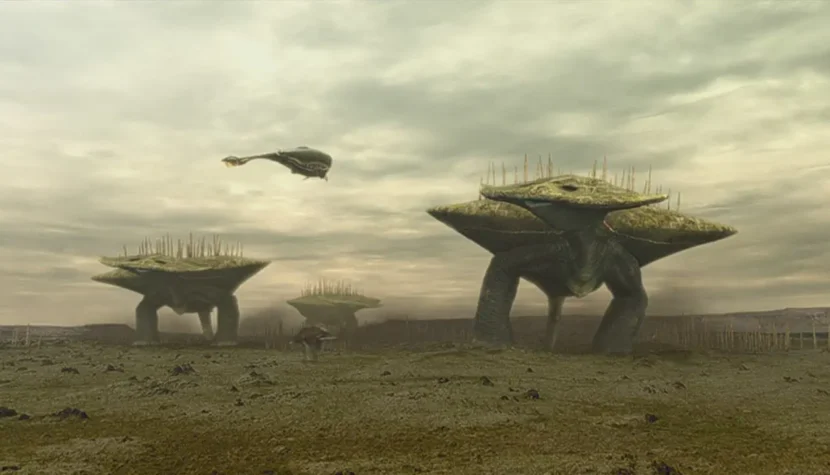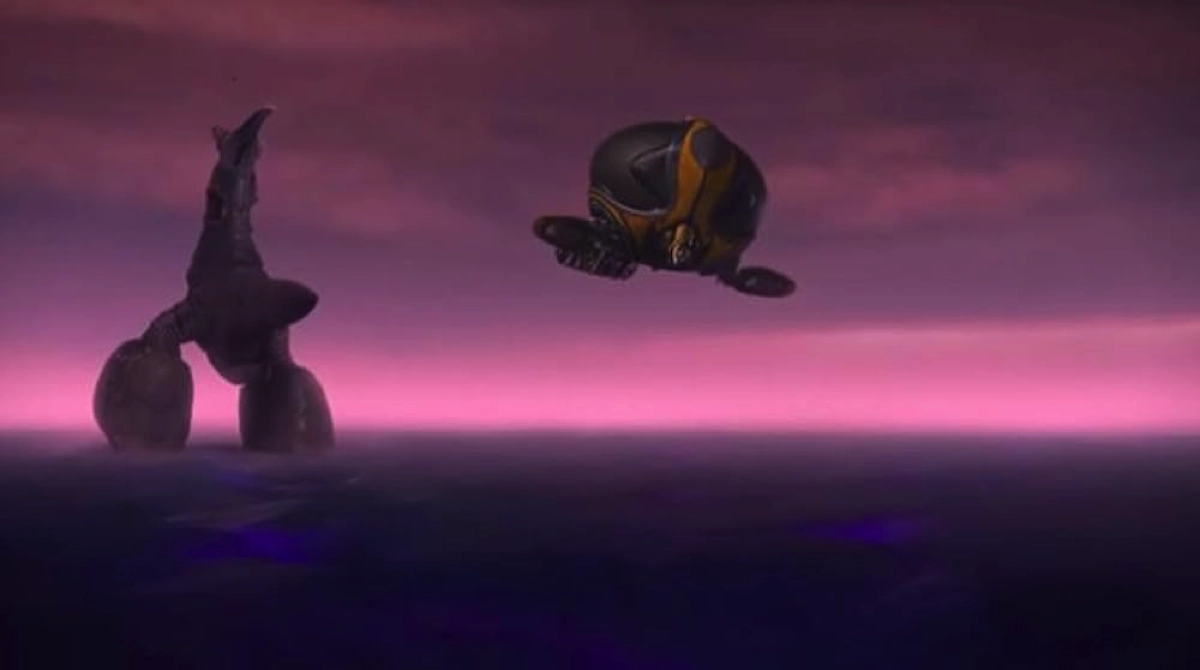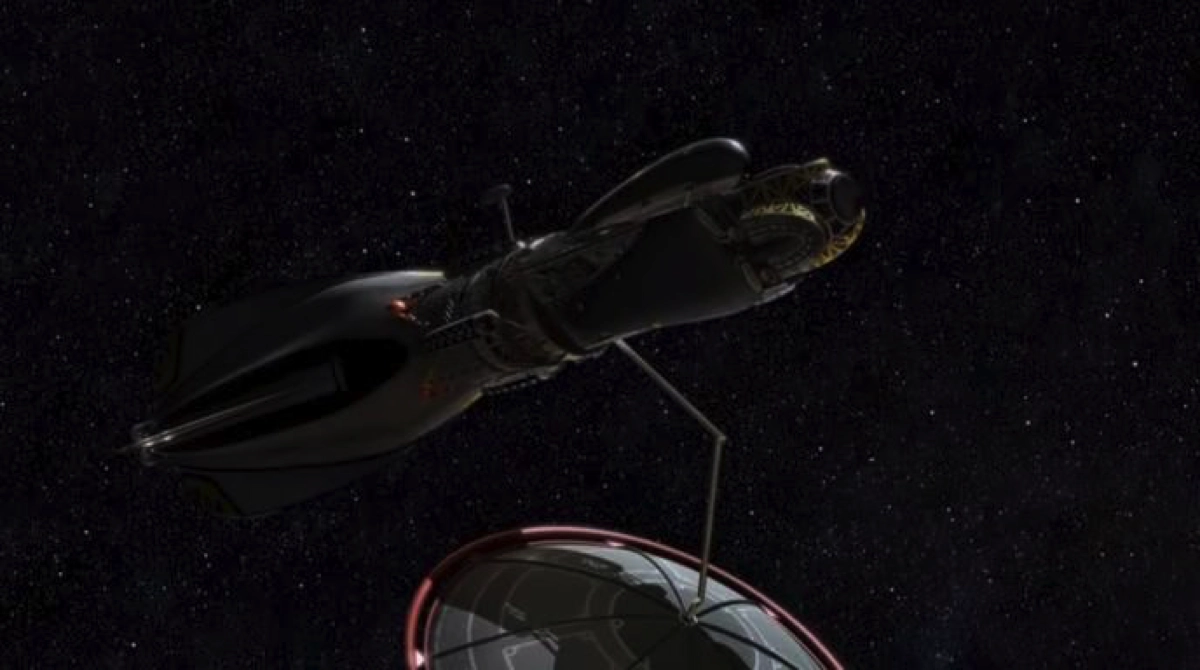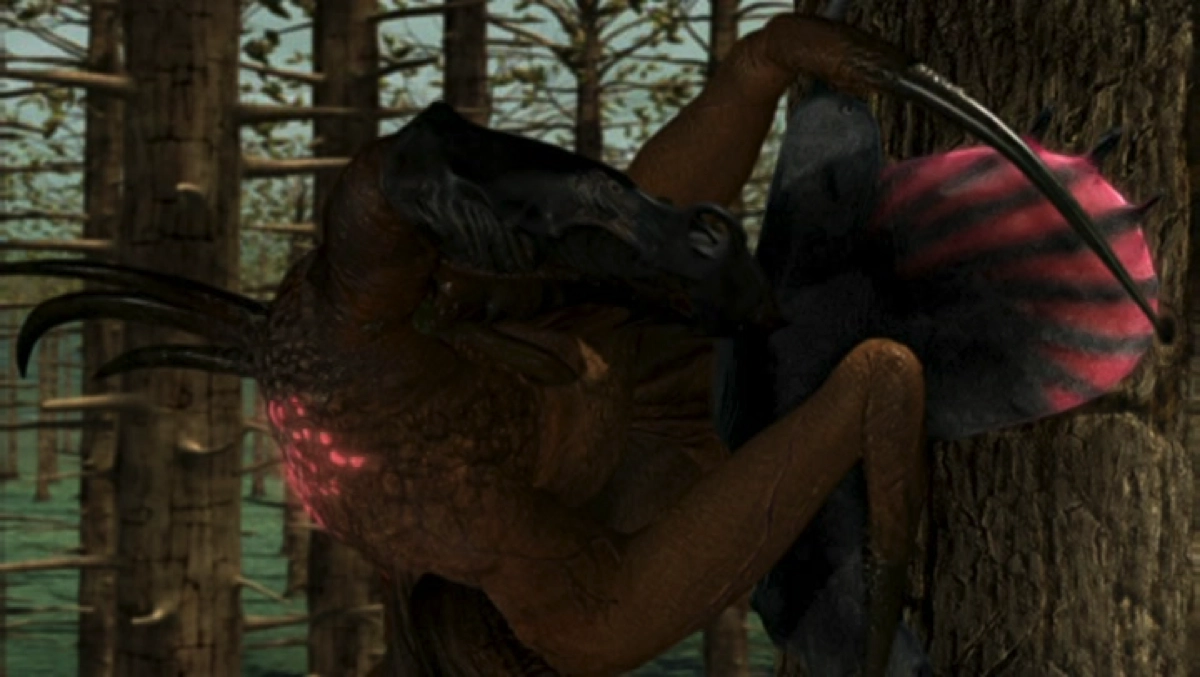ALIEN PLANET: Jaw-dropping Science Fiction Experiment

At the very beginning, I warn that the film described below is not another variation on the theme of bloodthirsty aliens attacking poor Earthlings, nor is it a horror/thriller dripping with blood and guts, although aliens can indeed be found in this film. Alien Planet is based on the book Expedition, an extraordinary experiment that cannot be easily placed within the confines of any particular film genre. It is a fascinating combination of computer simulation of an unknown planet with commentary from world-renowned scientists. Who are we? Are we alone in the universe? What does life on planets outside our Solar System look like? Are there any forms of intelligent life there? Will we ever be able to colonize other celestial bodies beyond our planet? These and other questions are asked by experts commenting on the entire experiment and serving as a collective narrator for the events presented on the screen.

The film alternates between simulation and scientific commentary. The main narrator of the events taking place on Darwin IV is the well-known actor John C. McGinley, who describes what we see on the screen step by step. A more detailed description and drawing conclusions is the task of the experts, but the creators decided not to limit themselves solely to the scientists’ commentary, and we also have George Lucas! In general, the whole concept comes from a rather simple assumption – what would happen if a computer-controlled unmanned ship were sent to another galaxy? Sounds pointless? Not at all. Alien Planet is merely a computer simulation created based on what was known about the universe at the time of its creation.
As an interesting fact, this simulation was created in collaboration with NASA. However, we live in times when technology and its derivatives are progressing at a breakneck pace, and it is uncertain what we will have to face in, say, a decade. Even now, such major advancements in technology and new inventions spark hundreds of discussions, often concerning moral issues. So, it is not so certain that we won’t experience sending missions to other galaxies in our lifetime. Returning to the film itself – Alien Planet is a very clever attempt to answer the question of what we might find on other planets, even in our own Solar System, and whether we will like it or not.

The plot, if one can call it that, revolves around sending a completely computerized spaceship, Von Braun, to another galaxy, specifically to the planet Darwin IV, which – as the name suggests – is the fourth planet in the Darwin system. The destination is located 6.5 light-years from Earth, has two suns, and 60% of Earth’s gravity. It will take Von Braun 42 Earth years to reach it – by then, no one from the expedition will be alive, but their children may be able to usher in a new era in human history. The creators assumed that in order to be as credible as possible, they had to reflect reality as best as they could. A team of scientists was involved in the production to ensure that the film adhered to the fundamental laws of physics, chemistry, biology, etc., which we know, and that it would be accepted by experts as a scientific experiment, not pseudoscience or an empty gimmick. It sounds a bit strange, but it’s quite simple in practice – Von Braun has no communication with Earth through any means; transferring any message will take several years, and although all the information and research results are sent to Earth, the Mother Ship must rely on its artificial intelligence to solve problems and make decisions.

Of course, we – the viewers – receive commentary from experts who were invited to comment on the creations proposed by the authors of the simulation, so we can follow closely what we see on the screen. Continuing, three probes – Balboa, Da Vinci (a.k.a. Leo), and Newton (a.k.a. Ike) – are sent to the planet Darwin IV to study it in detail. Unfortunately, Balboa gets into an accident and becomes useless. Of the remaining two, Da Vinci is to study the topography, vegetation, and basic life forms on the planet, while Newton is tasked with studying more advanced life forms, including any predators. Both have different software and modules that allow for filtering the collected data, and potential alternative behavior scenarios in unforeseen circumstances. All information is sent to the Mother Ship and later, after filtering, to Earth.

The world of Darwin IV is beautifully designed. We have stunning landscapes that at times resemble our Earth, still unspoiled by humans. There is an incredible variety of creatures and different kinds of “beings” shown on the screen. There are plants with bizarre properties, interesting little creatures living peacefully, but also aggressive predators with strange shapes and murderous tendencies. What is even more interesting, the creators went further – instead of inventing increasingly strange “alien life forms,” they decided to recreate what might have grown out of prehistoric forms that we know (or at least archaeologists know) from research and discoveries on Earth, in a reality different from Earth. Simply put – what would such (for example) dinosaurs look like after a different evolutionary path, without any comets, developed through other factors.

I’ll just say that it’s quite a sight to behold. The diversity of sizes, shapes, and characteristics of all the creatures is truly astonishing and impressive. I should also mention that, for obvious reasons, only a tiny fragment of the example of life forms on Darwin IV is shown, and this presentation is enough to make one think about what we have in our own backyard. This is what can be considered the message, if there is one in Alien Planet– Earth once looked like this too, and by doing what we do, for example, with one of our most precious gifts – water – we are destroying the planet we’ve lived on for millions of years. Recklessness and the pursuit of “development” can end badly – and we just need to look at what we still have left because there is still beauty in it.

All the explanations and comments from the experts, although they are speculative science, are completely credible, because they are not fiction, but science fiction, supported by the knowledge of the world’s brightest minds, minds like Dr. Stephen Hawking – one of the most famous researchers of our time. I admit that, although I’m not particularly interested in scientific musings, in Alien Planet, practically all of the experts’ commentary captured my attention with its fascinating content and accessibility. The film, through its form, content, and scientific commentary, might seem completely indigestible for the average viewer who is not interested in such complex and complicated scientific issues. However, this impression is highly misleading because Alien Planet is made in such a way that all this complexity is presented in an incredibly simple manner – in other words, we are shown the results of research and years of reflection, not the process of coming to them.

Moreover, Alien Planet fits perfectly within the canon of science fiction cinema intended for everyone. This is supported, among other things, by the fact that the content is presented through both a scientific-mathematical and a humanistic lens, which should be enough even for the most demanding viewers. The scientists present a few technical details but do not bore us with unnecessary numbers, limiting themselves to the required and, frankly, interesting minimum. Instead of indulging in scientific speculation, they try to present the problem from different perspectives, both historical/archeological and moral. Questions about our existence, awareness of our heritage, our role in the universe, as well as whether there are (and if so, how many) other intelligent life forms in the universe, and what we can offer them, are raised. At the same time, they show us that the world created for the film can be credible, and they present the probable roots of what is shown to us, thus proving that theoretically such a world could exist on Earth, if not for certain events in distant history.
However, Alien Planet is not just scientific musings. The film has a plot around which all the events unfold. It essentially has everything you would expect from a typical action movie – there are chases, there are unexpected twists, and there is quite a bit of drama that nicely complements the film’s storyline. All of this is supported by a good musical score and stunning animation. Everything was designed with the viewer in mind, so they wouldn’t get bored and could absorb the world created for them. After all, awareness is important. There are questions that everyone should ask themselves at least once. And even if someone is not interested in such knowledge, Alien Planet is like a breath of fresh air in the film industry, which has become rigid from clichés, and I think comparing it to good science fiction, but without the movie stars, would not be entirely inaccurate. I won’t spoil the plot, a brief outline is provided above. Let each person discover this fascinating world prepared for us by the experts. The scientists prove that they are not only interested in themselves and their research.

Awareness of the future matters just as much as awareness of our heritage. We must understand our place in the universe to appreciate what we have here, to finally respect it and make use of it. Perhaps through this, we will also understand where we came from and where we are headed. Paraphrasing Dr. James Garvin from NASA: we haven’t seen anything yet, and it can only get better – the next centuries could be incredibly fascinating if we steer the development of technology in the right direction, and the space between scientific fiction and facts will gradually shrink. Who knows, maybe in 200 years, one of my descendants will be able to fly the Millennium Falcon. I admit, there is a lot of information in the film, and it can feel overwhelming or confusing, but after all, you don’t have to memorize it, and you can always watch it again. Personally, I feel more educated.
To sum up, if you are open to new experiences and knowledge, if you approach discussions about aliens without unnecessary skepticism and cynicism, I highly recommend Alien Planet, as it is an innovative piece covering truly interesting topics. However, if even this text causes an involuntary smile of pity on your face, then perhaps you should not delve into this digital experiment, dear reader, because while the action is action, that’s not really what this film is about.

